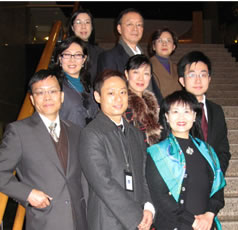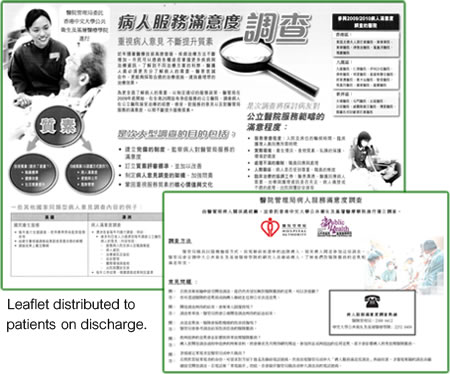

 |
||||||
|
||||||
According to Ms Pauline Wong, Chief Manager (Patient Relations and Engagement), the PSS has become an internationally important and useful tool for collecting the feedback of patients in many European countries, as well as the US and Australia. All along, Hong Kong public hospitals have been regularly conducting their own patient surveys; this HA-wide PSS is the first of this scale in Hong Kong or anywhere in Asia. By launching it, the HA aims to establish a robust mechanism to gauge patients' feedback, enhance quality assessment standards and reinforce HA's core values and culture of providing quality services. The PSS is being centrally coordinated by the Patient Relations and Engagement Department of HA Head Office. A Task Force with representatives from the seven hospital clusters and also patient groups has been actively involved in preparing for it during the past year. The School of Public Health and Primary Care of the Chinese University of Hong Kong (CUHK) has been appointed to conduct the PSS, for the scientific rigour of its proposed methodology, experience in conducting surveys in the local healthcare setting, as well as its networking with overseas experts in PSS. Professor Angela Coulter, former Chief Executive of the Picker Institute Europe (PIE), is the external expert advisor of CUHK for the HA PSS. PIE is an internationally renowned research organisation and one of the most experienced institutes in conducting large scale surveys in the healthcare sector. PIE collaborates with Britain's National Health Service and many other medical service providers in Europe. Professor Coulter is advising on the development of the questionnaire and the implementation of the PSS. She has also been invited to share her experience with our front-line colleagues at a workshop scheduled for the middle of this year. Ms Wong says that the PSS is being conducted in two phases. Phase 1 began in 25 acute and extended-care hospitals at the end of December 2009, and it involved 500 patients. This is a validation survey to develop and fine-tune the instrument for measuring patient satisfaction in Phase 2, and so its results will not be reported. Phase 2 will start in the second quarter of this year involving 5,000 patients. The data collected in Phase 2 will be analysed by the CUHK, and its findings are expected to be ready by the first quarter of 2011. After that, the Patient Relations and Engagement Department, the CUHK (including Professor Coulter) and the seven clusters will put their heads together to formulate quality improvement action plans. They will also discuss the best format and approach for reporting on the results of the PSS. |
|
|||||
Stratified random sampling is being used to select the discharged patients who will be asked to participate, and our staff will contact them by telephone. With their consent, the CUHK will contact them for follow-up telephone interviews, during which they will be asked to comment on the services they received during their stay, the cleanliness and comfort of the hospital environment, mechanisms for handling complaints, interpersonal relationship with healthcare providers, and the co-ordination of their treatment. Dr PY Leung, Director (Quality & Safety), believes the PSS will demonstrate the HA's commitment to quality through the establishment of this new quality improvement mechanism for public health services. Asked whether he is worried the public might compare the services in different hospitals, Dr Leung replies that overseas experience has shown that institutions which have conducted a PSS have experienced enhanced doctor-patient relationships. "They are also able to invest resources in ways that satisfy their patients' expectations. As a result, the patients' confidence in healthcare professionals will be further enhanced."
Dr Leung sincerely hopes patients will voice their opinions during the PSS. He also emphasises that all patient data will be handled in strict confidence, and it will be used solely for study purposes. |
||||||
The HA will be able to enhance its service delivery if doctors and patients work closely together. Improved service quality will not only benefit patients; it will also benefit all of us who serve the public wholeheartedly. "When patients experience the desired outcome of their treatment, they will naturally appreciate our efforts, trust us more, and respect us more," Dr Leung |
||||||

